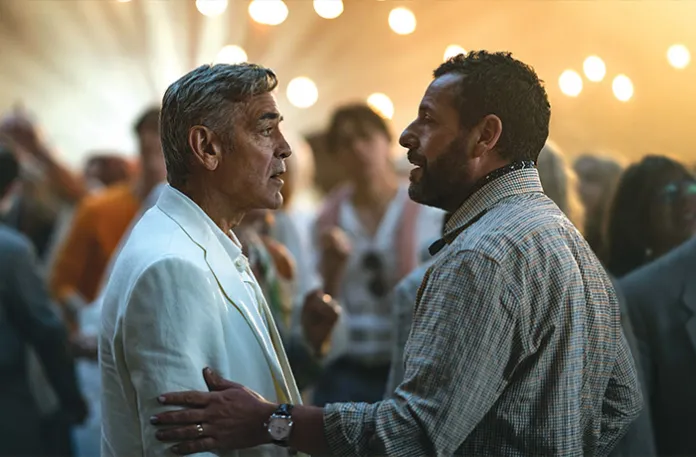Bad Bunny: Review of ‘Black Rabbit’ on Netflix
Teh article is a critical review of Netflix’s limited series *Black Rabbit*, starring Jude Law and Jason bateman. The show centers around two brothers, Vince and Jake, who are entangled in debt with loan sharks while navigating the world of high-end Manhattan restaurants, organized crime, and personal trauma. Despite a promising premise and strong leads, the reviewer finds the series overwhelmingly bleak, with unlikeable characters, scattered and frequently enough illogical subplots, and a relentless tone of anxiety and unpleasantness.
The narrative includes morally dubious actions such as arson and embezzlement, alongside darker themes like sexual assault and drug abuse, but lacks coherent judgment or meaningful commentary on these issues. compared unfavorably to Hulu’s *The Bear*, *Black Rabbit* fails to ground its story in relatable social or class realities and instead bombards viewers with relentless tension and missteps.While the show features some creative storytelling moments and solid performances, it is criticized for being confusing, boring in parts, and devoid of humor, making the eight-hour runtime a tough experience.
ultimately, the review suggests *Black Rabbit* feels like a Netflix product aimed at filling content quotas rather than crafting quality prestige television, and its ending likely rules out a follow-up.
Bad Bunny: Review of ‘Black Rabbit’ on Netflix
It did not take many episodes of Netflix’s new limited series Black Rabbit to find myself rooting for most of the characters to be jailed.
On its face, Netflix’s new prestige miniseries, led by Jude Law and Jason Bateman, seems like a big draw, exploring the world of New York high cuisine, organized crime, and the ripples of childhood trauma. There’s a lot there to draw different viewers. Perhaps the most obvious comparison is Hulu’s series The Bear, another high-anxiety show about the world of elite restaurants named after animals. Indeed, it seems likely that Black Rabbit was pitched to Netflix executives directly to compete with The Bear — “where’s our restaurant-centered, high stress, family dysfunction, prestige content?” That’s about the extent of the comparison, however. Artistically, all Black Rabbit manages to ask is, “Do you want to feel anxiety for eight hours straight?”
The story follows two brothers, Vince (Bateman) and Jake (Law), as they try to pay back $140,000 to loan sharks. At first glance, they’re an odd couple. Vince is the screwup, a mostly-former drug and gambling addict, while Jake is a successful restaurateur, running the eponymous club/restaurant Black Rabbit in Manhattan.
What becomes clear over the course of the show is that they both suck. Vince commits vehicular homicide in the first episode and returns home to New York City, setting in motion the events of the show when he’s forced to take on debt that he accepts having accrued, even as the show confusingly says later that he didn’t. Jake is revealed to be embezzling from his business and steadily engages in a series of moral, personal, and legal trespasses that are at least as bad as Vince’s.
In one of many tonally jarring subplots, Vince works out a scam to burn down his dead mother’s house in Brooklyn to collect the insurance money with the help of a corrupt fire marshal. Jake briefly objects that arson is illegal before agreeing to help out. The two reminisce in their childhood bedroom over a joint and bond as siblings over their respective failures in life before torching the place.
Could the fire spread to neighboring houses? Could it injure an innocent firefighter? Who cares! No concerns are raised, and the scheme goes off without a hitch.
Other moral weirdness abounds. One of the longest-running subplots of the show is about a wealthy artist who serially drugs female employees at the restaurant and sexually assaults them. Just days after one of his would-be victims nearly overdoses on spiked cocaine and another is killed under suspicious circumstances, a third employee tells the staff that if they need to “do a bump or whatever to get through tomorrow’s service, then that’s what you need to do, and ain’t nobody gonna judge.”
That is a very strange message to put in the mouth of a character who is trying to uncover the truth about what happened to the recently deceased rape victim.
Is it a deliberate, nihilistic choice of the show’s creators to give us a cast of thoroughly unlikeable people? Maybe. But then why spend so much time making Jake and Vince struggle with the moral and legal ramifications of their decisions? It seems more likely to me that the writers just didn’t think about it all that much. So many of Black Rabbit’s subplots are confusing, boring, or dumb. And yet, there are so many of them.
In an early effort to pay off his gambling debt, Vince takes $2,500 from a friend, goes to a high-end illegal casino, and turns that into $75,000 at the blackjack table before going bust in a scene reminiscent of the start of Rounders. But the entire point in Rounders is that Matt Damon’s character thinks he has the winning hand. Vince’s hand makes no blackjack sense and has no dramatic payoff. He subsequently runs away from the casino, pursued by bad guys, exactly where he was before he got the money.
Black Rabbit frequently retreads territory in this way from better shows and movies. The first two seasons of The Bear were simultaneously very funny and also earned their panic-attack-inducing tension by grounding the characters and story in the dysfunctions of a middle-class family in Chicago. Black Rabbit name checks Coney Island and alludes to Vince and Jake having a working-class background of some sort, but doesn’t have anything discernible to say about New Yorkers or class in America. It keeps viewers tense with a cavalcade of unpleasantness, including murder, suicide, rape, drugs, spousal abuse, home invasion, infidelity, a severed finger, video of a man getting paralyzed, and so on.
Other methods are dumber, including bad guys who constantly show up at the right place and time to surprise our heroes with violence and, if my count is correct, three separate foot chases down office building stairwells.
More bleakly, while the characters are supposed to have charm and heart despite the nightmare they are living, there are almost no jokes in the show. That’s tough going across 451 minutes of run time. Bateman and Law give perfectly fine performances, but I desperately wanted some of the supporting actors to try to chew some scenery just for the sake of variety. Troy Kotsur, a deaf actor who performs in sign language and who won an Oscar in 2022 for CODA, comes closest as the mob boss Mancuso. It turns out that threats delivered in silence are particularly menacing.
YOUR MOVIE TICKET, SHOULD YOU CHOOSE TO ACCEPT IT…
In what is otherwise a slog of a show, Black Rabbit gets structurally creative in the sixth episode when the events of a robbery at the restaurant are shown from different perspectives. That episode feels like it could have been the core of a better, much shorter movie or miniseries. And maybe it was. Netflix often seems to commission works that end up as forgettable, mediocre simulacra of Oscar-winning movies or prestige television shows. Earlier this year, a writer for the literary magazine N+1 reported that two high-level executives at Netflix are known to greenlight scripts without reading them and that the company frequently tells screenwriters to have characters vocalize what they’re doing “so that viewers who have this program on in the background can follow along.”
Black Rabbit is too confusing a show to be the kind of casual viewing that that quote is describing, but it certainly feels like the product of a tech company that is not concerned about traditional TV ratings or theater receipts. Freed from the opinions of a paying audience or advertisers, an eight-hour-long stress test might make a lot of sense if all you care about is churning out content for subscribers to binge who want something that’s sort of like other shows and movies that aren’t on your streaming service. And that might be good business for Netflix, but perhaps the best thing that can be said about Black Rabbit is that its ending likely precludes a sequel.
Andrew Bernard is a correspondent for the Jewish News Syndicate.
" Conservative News Daily does not always share or support the views and opinions expressed here; they are just those of the writer."




